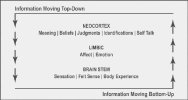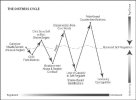I might be getting ahead of myself (having not read all the recent recommended books), but after reading Ressler and Samenow, I'm not sure what to think about the possible causes for criminality, thinking errors etc. I mean, from Ressler I got the impression that he emphasized way too much the role of "nurture" and the persons early history and environment. Samenow on the other hand dismisses the "nurture" aspect almost completely. Or, at the very least, he doesn't think it's productive to try and understand the past traumas – that it's more important to correct the thinking errors, no matter what their cause is.
Then again, Ressler is describing really sick and pervert individuals, who do really horrible things (serial killers etc). Perhaps in their case both "nature" and "nurture" plays a role? Still, even with the great results Ressler got with his profiling, I find his explanations a bit naive. For instance, we know that psychopaths can come from any type of family environments. If I remember correctly, he does mention this in passing, but still he insists that the profiling almost always found traumatic events in the individuals history. Perhaps the individuals lied (as Samenow points out), or perhaps these individuals created the traumatic surroundings themselves?
Right now, I think that past traumas do have a significant role for us "ordinary" people, how we turn out and how we formulate our thinking, but that the solution for treatment doesn't solely (if at all) lie in understanding and re-living these past traumas.
What's your take on this whole "nature" vs. "nurture" thing?
Then again, Ressler is describing really sick and pervert individuals, who do really horrible things (serial killers etc). Perhaps in their case both "nature" and "nurture" plays a role? Still, even with the great results Ressler got with his profiling, I find his explanations a bit naive. For instance, we know that psychopaths can come from any type of family environments. If I remember correctly, he does mention this in passing, but still he insists that the profiling almost always found traumatic events in the individuals history. Perhaps the individuals lied (as Samenow points out), or perhaps these individuals created the traumatic surroundings themselves?
Right now, I think that past traumas do have a significant role for us "ordinary" people, how we turn out and how we formulate our thinking, but that the solution for treatment doesn't solely (if at all) lie in understanding and re-living these past traumas.
What's your take on this whole "nature" vs. "nurture" thing?


